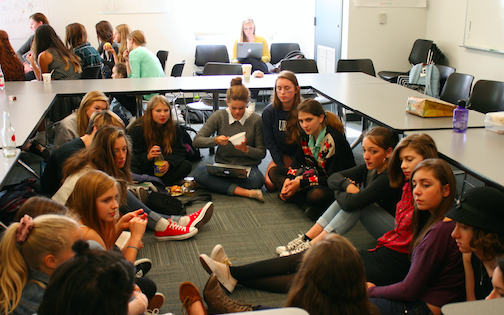Urban School Students are Debunking the Myth of Perfection

An increasing number of college students are struggling with mental health issues, often prompted or reinforced by academic and social pressures placed on them by friends, parents, and themselves, according to an article recently published in the New York Times entitled “Suicide on Campus and the Pressure for Perfection” by Julie Scelfo. The majority of college and high school students, including Urban students, face many similar pressures, but though these feelings may be the norm, the way Urban helps students deal with these problems seems to be an exception.
Urban has a number of spaces set up to allow students to share how they feel. As people are simply sharing, it may not be apparent how useful these spaces are. In actuality they help mitigate one of the major issues causing so many mental health problems among college students.
As the New York Times article reported, a big challenge facing college students is the pressure to appear perfect. When everyone tries to hide that they are struggling, it creates an environment in which no one feels comfortable admitting they are facing challenges, as they don’t want to be the only ones who aren’t happy.
Some of the most popular Urban-run platforms for emotional expression between students are affinity spaces and the Peer Ed. show, in part because they allow students to see that it is okay to struggle.
“I really like Peer Ed. Show… I like seeing other people’s thoughts and that sort of thing. You learn a lot about people that you wouldn’t otherwise know, because I think especially at Urban, even though Urban is a really supportive space, there is a pressure to seem like you have your life together” says Daniela Sweet-Coll (‘16).
Urban students are not only encouraged to share their emotions with the larger community by the school administration, but they are also often rewarded for making themselves vulnerable with messages of support from their peers. This is an especially common occurrence in the Saltwater Women section of the SWEAR (Students for Women’s Equality and Rights) conference. Saltwater Women is a folder for SWEAR members to post pictures of themselves crying to express how they are feeling to the SWEAR community.
“If someone feels like they have nobody, it’s kind of hard to ball that all up inside of you by yourself, and that can cause a lot more emotional struggles and take much more of a toll on someone… Having the conference I think benefits someone in that they just are able to let it out and let it go into that conference, and so people are replying to her and saying like ‘it’s ok, I’m here, it will be better”, says SWEAR co-leader Kaylah Breiz (‘17).
While the Urban students interviewed do not feel alone in their struggles, some acknowledge they do still feel a pressure to appear happy.
“I do think Urban is very supportive, and there are plenty of opportunities to share” says Jade Barnblatt (‘18), but Barnblatt also feels if she doesn’t act happy: “it’s constantly like ‘what’s wrong?’ and sometimes I’m just … not in a good mood. It’s tiring to try to explain everything, so sometimes it’s just easier to …‘be happy’”.
To help remedy feelings like this, students have suggestions for what more the school could do to give students opportunities to support each other.
“I think that it would be helpful to have more mixed grade spaces where you could express how you feel”, says Sweet-Coll.
Another suggestion, by Abby Lim-Kimberg (‘16), is to give students more opportunities to free write in the beginning of classes. “I found that whenever I was assigned a free write I would always ditch the prompt and write however I was feeling or what I was thinking, what I was excited about, any of that. I would just write recklessly… It helped me flush out all of my emotional craziness before needing to focus and learn” says Lim-Kimberg.
Urban students greatly value the opportunities they are given by the school to express themselves, as well as to support and learn from each other. They make use of these resources and have their own suggestions for further developing emotional expression at Urban. Now, it seems, the real test will be taking the insights they learn at Urban and applying them to the rest of their lives, in college and beyond. If Urban’s sharing environment proves valuable to students, they may also share this mindset of support and emotional expression with the world, which needs it desperately.
